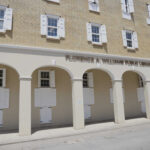
A wide-ranging forum on Christiansted’s future featured Governor Albert Bryan Jr. saying the Florence Williams Public Library needs a new direction, and continued with merchants, Waste Management and VIPD discussing sanitation, lighting, enforcement, and events to revive the town.
Referencing the library directly, the governor said at the Thursday forum, “the library thing isn’t working.” He told the audience, “You should just take the library and turn it into a museum with spaces… maybe turning that into a museum with some art, some displays,” adding that modern access to “Open Library” allows people to download materials digitally. He pressed for “thinking different levels,” and for reimagining civic spaces so they no longer “just [burn] your tax money every day.”
Merchants then raised immediate pain points. One business owner described construction scaffolding blocking pedestrian flow on Company Street, saying it has “hampering our business” and asking that barriers be adjusted so customers can use the arcades. Another owner flagged inconsistent tariffs on locally manufactured goods shipped off-island, asking for clarity since “everything that’s manufactured here on the island supposedly should not have to pay.” The governor replied that the tariff issue “has to be solved in Washington” and said his office was working federal channels.
The V.I. Waste Management Authority briefed on compliance pamphlets for every Christiansted business, warning that “no business [is] allowed to take your trash to any [roadside] site,” and stressing monthly landfill accounts for low-volume generators. The governor pressed for solutions on homeless rummaging, illegal dumping in public bins, and especially restaurant grease. He suggested requiring every establishment to use a registered hauler and to “account for all the grease,” warning that it clogs lines: “Grease don’t go away.” WMA officials explained that inspectors routinely visit restaurants to check their grease traps. If a trap is dirty or not maintained, the business is given time to clean it before inspectors return. If the problem remains, officers issue citations, which can carry fines of up to $1,000. Governor Bryan noted that strict enforcement often draws complaints from business owners, which is why WMA is first distributing educational pamphlets to help establishments understand the rules before penalties are imposed.
Parking and traffic enforcement surfaced repeatedly. The governor asked VIPD leadership not to reassign a well-known officer who enforces two-hour limits, and reminded drivers of the 20-foot setback at corners to maintain visibility. Business owners also pressed for more frequent garbage pickup, saying overflows and boxes in public bins hurt the town’s image.
VIPD leadership outlined new technology: 23 cameras for Frederiksted and another 23 for Christiansted, license-plate readers along Queen Mary and Melvin Evans Highway, and drone deployment from multiple points to feed real-time video into a 24-hour Real Time Crime Center slated for the Frederiksted station by the end of November. St. Croix Chief of Police Uston Cornelius said coverage should be “in full swing” for Crucian Christmas Festival season, while conceding staffing is lean and officers are stretched across calls for service.
The governor broadened the revitalization lens: more events, earlier evening activities that match resident habits, and measures like temporary street closures to “create activity” downtown. He said older demographics with spending power are home early; programming should “get them to come to town and feel safe.” He invited ideas via email and urged funneling feedback through CRRA to streamline fixes.
Blight and abandoned vehicles drew frustration. The governor said the abandoned-car program had shifted back to VIPD, that removal faces due-process limits on private property, and that current law restricts action even when derelict cars or equipment accumulate in neighborhoods. He suggested the territory consider local ordinances similar to stateside standards—limits on vehicle counts in yards, restrictions on semis, and prohibitions on heavy equipment in residential zones—so agencies can intervene before blight spreads.
Returning to economic development, he argued that better schools in town cores could spur residential investment, and that stronger community support for legislative initiatives is essential. “If the people want it done, we gonna get it done,” he said, urging attendees to back proposals when they reach the Senate.
Throughout the evening, the through-line was pragmatic: repurpose under-performing public assets, tighten sanitation and grease compliance, improve lighting and patrol visibility, deploy cameras and drones before festival season, and program consistent events—concrete steps, business owners and officials agreed, to make Christiansted cleaner, safer, and more inviting.
British Caribbean News

